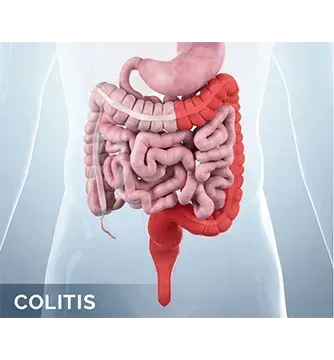

Ulcerative Colitis
Ulcerative colitis is a condition that causes diarrhea, belly pain, and bloody bowel movements. These symptoms happen because the large intestine becomes inflamed and gets sores, called "ulcers." The large intestine is also called the colon.
Symptoms can be mild or severe. They might happen just once. Or they might go away and come back over and over again. Possible symptoms include:
Diarrhea that might happen 10 or more times a day

Yes. There are a few tests that can help doctors diagnose ulcerative colitis. Doctors usually use a test called a "sigmoidoscopy" or a similar test called a "colonoscopy". For these tests, the doctor puts a thin tube into your rectum (the lower part of the large intestine) and threads it up into your colon.
The tube has a camera attached to it, so the doctor can look inside your colon. The tube also has tools attached, so the doctor can take samples of tissue to look at under the microscope. Other tests might include X-rays or scans.
It depends. There is no specific type of diet that has been proven to help people with ulcerative colitis feel better. But some people do notice that certain foods seem to make symptoms worse. If this happens to you, your doctor might suggest avoiding those foods for a while to see if you feel better. For example, some people feel better if they avoid dairy foods like milk, yogurt, and cheese.
If you do avoid certain foods, your doctor might suggest taking supplements. This can help make sure you are getting the nutrients you need.
Depending on your symptoms, your doctor might prescribe:
For most people, symptoms go away after just a few weeks of treatment.
When medicines don't work, surgery can help. There are 2 types:
In most cases, ulcerative colitis does not affect a woman's ability to get pregnant. If you want to have a baby, talk to your doctor or nurse before you start trying to get pregnant. He or she can make sure you get all the tests you need before and during your pregnancy. It is important for ulcerative colitis to be properly treated during pregnancy. Your doctor or nurse might want to switch your medicines. That's because some of the medicines used to treat ulcerative colitis might not be safe for a baby. Your doctor might also want to put you on a higher dose of folic acid than women without ulcerative colitis need.
Conditions like ulcerative colitis run in families. So, if you have a child, he or she might get it, too.